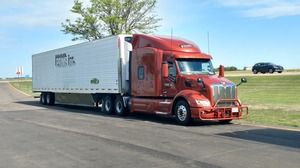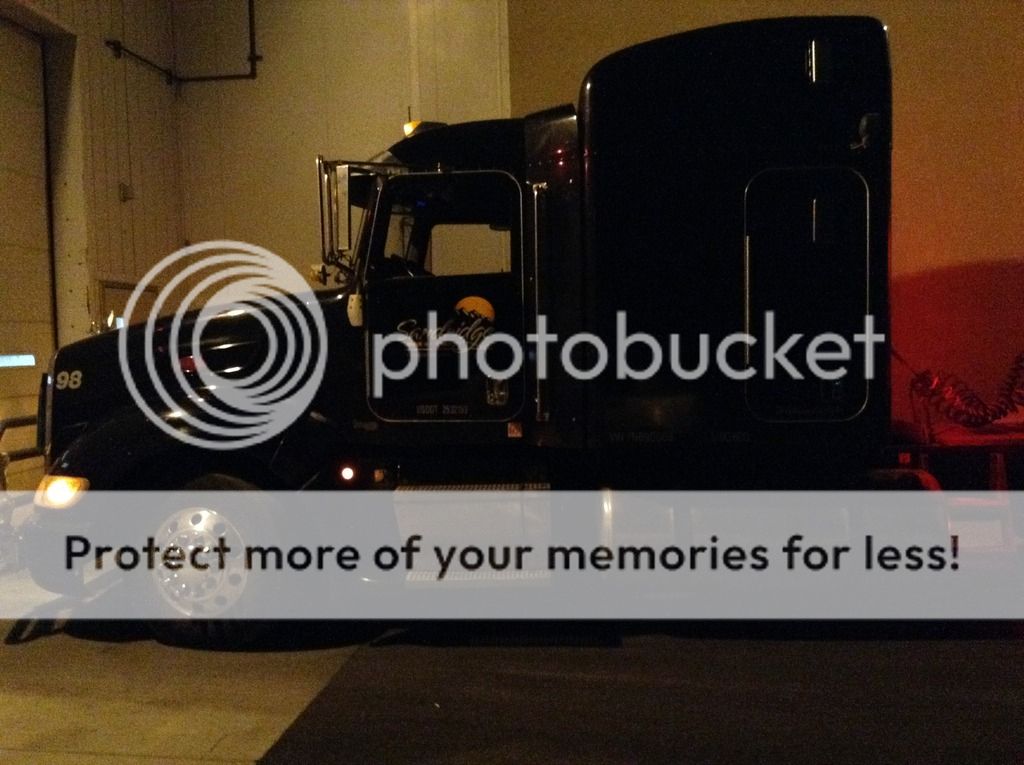New E-log Rules
Topic 11802 | Page 1
The biggest hurdle I will need to overcome, however, involves the e-log: I simply don't understand it
I only used paper logs my entire career. What's interesting is that back then you really didn't need to know the logbook rules very well because you could write down anything you wanted to. Plus the logbook rules back then were quite a bit simpler. There wasn't much to know - 10 on, 8 off, split the sleeper berth if you want, 70 hour limit - that's about it! That's all there was.
What you're going to find with elogs is that you can still turn 3,000+ miles per week but you're forced to do it "by the book". With the combination of the 11 and 14 hour rules once your day starts you have to keep going and going and going. Back in the day with paper logs we could run when we wanted to and shut down when we wanted to. We had a ton of flexibility. That's gone now unfortunately and I feel like it's made the roads a lot more dangerous.
For instance, I figured out real quick that stopping for a break every two or three hours max was great policy. It felt great to get out of the truck and stretch your legs, freshen up the mug of coffee, walk around a little bit, use the restroom, and take a few deep breaths of fresh air. You get back in the truck and you almost feel like you're starting your day all over again. I rarely ever drove more than three hours at a time and yet I turned 3,000 - 3,500 miles per week consistently throughout my career.
On top of that you could stop anytime you wanted to for heavy traffic, a passing thunderstorm, or a short nap. Nowadays once that 14 hour clock starts on elogs you run, run, run if you want a decent paycheck at the end of the week. All of this stopping for weather, stopping for short breaks, and stopping for naps mostly goes out the window.
So you'll be able to turn the miles with elogs but you're going to have to learn the rules inside and out so you can make the absolute most of your time available. The best way to do that is with the Logbook Rules Training Module in our High Road Training Program. Go through that and you'll be thanking yourself endlessly that you did. Knowing the logbook rules thoroughly with elogs is a requirement if you want to turn good miles consistently.
CDL:
Commercial Driver's License (CDL)
A CDL is required to drive any of the following vehicles:
- Any combination of vehicles with a gross combined weight rating (GCWR) of 26,001 or more pounds, providing the gross vehicle weight rating (GVWR) of the vehicle being towed is in excess of 10,000 pounds.
- Any single vehicle with a GVWR of 26,001 or more pounds, or any such vehicle towing another not in excess of 10,000 pounds.
- Any vehicle, regardless of size, designed to transport 16 or more persons, including the driver.
- Any vehicle required by federal regulations to be placarded while transporting hazardous materials.
Logbook:
A written or electronic record of a driver's duty status which must be maintained at all times. The driver records the amount of time spent driving, on-duty not driving, in the sleeper berth, or off duty. The enforcement of the Hours Of Service Rules (HOS) are based upon the entries put in a driver's logbook.
Elog:
Electronic Onboard Recorder
Electronic Logbook
A device which records the amount of time a vehicle has been driven. If the vehicle is not being driven, the operator will manually input whether or not he/she is on duty or not.
Elogs:
Electronic Onboard Recorder
Electronic Logbook
A device which records the amount of time a vehicle has been driven. If the vehicle is not being driven, the operator will manually input whether or not he/she is on duty or not.
Sleeper Berth:
The portion of the tractor behind the seats which acts as the "living space" for the driver. It generally contains a bed (or bunk beds), cabinets, lights, temperature control knobs, and 12 volt plugs for power.
OWI:
Operating While Intoxicated
The latest "The Trucker Newspaper" has an article on the "Final" rule on e-logs.
Dave
Would you mind quoting it or posting a link if it is online? I don't have access to that soooo... telling me it's printed somewhere doesn't help much.
Elog:
Electronic Onboard Recorder
Electronic Logbook
A device which records the amount of time a vehicle has been driven. If the vehicle is not being driven, the operator will manually input whether or not he/she is on duty or not.
CSA:
Compliance, Safety, Accountability (CSA)
The CSA is a Federal Motor Carrier Safety Administration (FMCSA) initiative to improve large truck and bus safety and ultimately reduce crashes, injuries, and fatalities that are related to commercial motor vehicle
FMCSA:
Federal Motor Carrier Safety Administration
The FMCSA was established within the Department of Transportation on January 1, 2000. Their primary mission is to prevent commercial motor vehicle-related fatalities and injuries.
What Does The FMCSA Do?
- Commercial Drivers' Licenses
- Data and Analysis
- Regulatory Compliance and Enforcement
- Research and Technology
- Safety Assistance
- Support and Information Sharing
Fm:
Dispatcher, Fleet Manager, Driver Manager
The primary person a driver communicates with at his/her company. A dispatcher can play many roles, depending on the company's structure. Dispatchers may assign freight, file requests for home time, relay messages between the driver and management, inform customer service of any delays, change appointment times, and report information to the load planners.OOIDA:
Owner-Operator Independent Drivers Association
Who They Are
OOIDA is an international trade association representing the interests of independent owner-operators and professional drivers on all issues that affect truckers. The over 150,000 members of OOIDA are men and women in all 50 states and Canada who collectively own and/or operate more than 240,000 individual heavy-duty trucks and small truck fleets.
Their Mission
The mission of OOIDA is to serve owner-operators, small fleets and professional truckers; to work for a business climate where truckers are treated equally and fairly; to promote highway safety and responsibility among all highway users; and to promote a better business climate and efficiency for all truck operators.

I know it's probably because I'm a young'un who was raised in the digital era, but I like elogs. I hate doing paper logs, they're tedious. I do wish they'd remove or change the two hour passenger seat limit for teams, but I'm not holding my breath on that one.
Elog:
Electronic Onboard Recorder
Electronic Logbook
A device which records the amount of time a vehicle has been driven. If the vehicle is not being driven, the operator will manually input whether or not he/she is on duty or not.
Elogs:
Electronic Onboard Recorder
Electronic Logbook
A device which records the amount of time a vehicle has been driven. If the vehicle is not being driven, the operator will manually input whether or not he/she is on duty or not.

I was just reading about this, the requirement goes into effect on Dec 11, 2017. So that means everyone has 2 years to get into compliance with the electronic logs requirements.
Ernie
Electronic Logs:
Electronic Onboard Recorder
Electronic Logbook
A device which records the amount of time a vehicle has been driven. If the vehicle is not being driven, the operator will manually input whether or not he/she is on duty or not.
Or use the loophole and run a truck 2000 year model or older lol.

The drivers say the companies that hire them to haul freight will be able to access the electronic logs and pressure drivers who haven't reached their limit of legally-allowed hours to stay on the road even if they want to rest.
Yeah I totally believe that's the reason... yup... suuuuuure
Electronic Logs:
Electronic Onboard Recorder
Electronic Logbook
A device which records the amount of time a vehicle has been driven. If the vehicle is not being driven, the operator will manually input whether or not he/she is on duty or not.

Guess what? Companies can amend your logs. Most companies have a COMPLIANCE OFFICER, which can go in and amend your e-log. I wonder how requiring e-logs will work, if small companies will just get someone certified as a compliance officer, who can change your log at will.
What if your e-log "is on the blink" and you are on paper logs.
When I was with Navajo, every time I was assigned a different truck, when I would log in on the Qualcomm for the first time, for that truck, the Qualcomm would say that there was something like 60 hours of unaccounted time, do I want to be credited with that time.
Naturally I would say NO! There are companies that are on e-logs ONLY, and some drivers are using paper logs, with the excuse that the "Qualcomm is on the blink."
There is always a way around this.
BTW, I never even thought about doing that when I was with Navajo.
Dave
Qualcomm:
Omnitracs (a.k.a. Qualcomm) is a satellite-based messaging system with built-in GPS capabilities built by Qualcomm. It has a small computer screen and keyboard and is tied into the truck’s computer. It allows trucking companies to track where the driver is at, monitor the truck, and send and receive messages with the driver – similar to email.
Screw elogs if I end up with one i can assure you it will be broken down all the time.
Elog:
Electronic Onboard Recorder
Electronic Logbook
A device which records the amount of time a vehicle has been driven. If the vehicle is not being driven, the operator will manually input whether or not he/she is on duty or not.
Elogs:
Electronic Onboard Recorder
Electronic Logbook
A device which records the amount of time a vehicle has been driven. If the vehicle is not being driven, the operator will manually input whether or not he/she is on duty or not.

Screw elogs if I end up with one i can assure you it will be broken down all the time.
Then I guess you won't be driving much. And oh by the way, companies that have elogs can access the device to see if it truly is on the fritz.......So keep that in mind......
Ernie
Elog:
Electronic Onboard Recorder
Electronic Logbook
A device which records the amount of time a vehicle has been driven. If the vehicle is not being driven, the operator will manually input whether or not he/she is on duty or not.
Elogs:
Electronic Onboard Recorder
Electronic Logbook
A device which records the amount of time a vehicle has been driven. If the vehicle is not being driven, the operator will manually input whether or not he/she is on duty or not.
Screw elogs if I end up with one i can assure you it will be broken down all the time.
That sounds awfully bold and full of bravado, but the winds of change are upon us, and like it or not you will be swept up with the rest of us into a new day for the trucking industry. The movers and shakers in this business saw this coming a long time ago and took steps to make sure they could comply and therefore stay in the game. You will too, even if you are dragged kicking and screaming into the future.
"Oh the times, they are a changing" -Bob Dylan
Elog:
Electronic Onboard Recorder
Electronic Logbook
A device which records the amount of time a vehicle has been driven. If the vehicle is not being driven, the operator will manually input whether or not he/she is on duty or not.
Elogs:
Electronic Onboard Recorder
Electronic Logbook
A device which records the amount of time a vehicle has been driven. If the vehicle is not being driven, the operator will manually input whether or not he/she is on duty or not.

Screw elogs if I end up with one i can assure you it will be broken down all the time.
Then I guess you won't be driving much. And oh by the way, companies that have elogs can access the device to see if it truly is on the fritz.......So keep that in mind......
Ernie
That's what a driver of another told me about an hour or two ago. He's on paper logs, but the company has an electronic device for communication purposes.
They'll know if you are trying to game the system.
Dave
Elog:
Electronic Onboard Recorder
Electronic Logbook
A device which records the amount of time a vehicle has been driven. If the vehicle is not being driven, the operator will manually input whether or not he/she is on duty or not.
Elogs:
Electronic Onboard Recorder
Electronic Logbook
A device which records the amount of time a vehicle has been driven. If the vehicle is not being driven, the operator will manually input whether or not he/she is on duty or not.
New Reply:
New! Check out our help videos for a better understanding of our forum features

















Preview:
This topic has the following tags:
Hours Of Service Logbook Questions Truckers Technology Understanding The Laws







 TT On Facebook
TT On Facebook
New gov't rule: 3 million truck, bus drivers must electronically record hours behind wheel.
Dec 10, 2015
By JOAN LOWY, Associated Press
WASHINGTON (AP) — An estimated 3 million commercial truck and bus drivers must electronically record their hours behind the wheel under a new government rule aimed at enforcing regulations designed to prevent fatigue.
The Federal Motor Carrier Safety Administration plans to release the final rule on Thursday. A copy was provided to The Associated Press.
Drivers have been required to keep paper logs of their hours dating back to 1938, but accident investigators and safety advocates have long complained that it's easy to change the logs or keep two different sets of records to evade restrictions on hours. Electronic logging devices automatically record driving time by monitoring engine hours, vehicle movement, miles driven, and location information.
"This automated technology not only brings logging records into the modern age, it also allows roadside safety inspectors to unmask violations of federal law that put lives at risk," Transportation Secretary Anthony Foxx said.
Efforts to require electronic logs that are more difficult to tamper with have been opposed by drivers who own their truck or small fleets of trucks. The drivers say the companies that hire them to haul freight will be able to access the electronic logs and pressure drivers who haven't reached their limit of legally-allowed hours to stay on the road even if they want to rest.
The Owner-Operator Independent Drivers Association, which sued the safety administration to block the rule, says on its website that it questions "the need for truckers to spend money on an unproven technology that is no more effective than paper logs when it comes to safety and hours-of-service compliance."
The safety administration estimates the electronic devices will provide a net savings of $1 billion a year, mostly through paperwork reductions. It also estimate about 26 lives will be saved and 562 injuries prevented each year. The rule also contains procedural and technical provisions designed to protect commercial truck and bus drivers from harassment resulting from information generated by the devices, the agency said.
Electronic Logs:
Electronic Onboard Recorder
Electronic Logbook
A device which records the amount of time a vehicle has been driven. If the vehicle is not being driven, the operator will manually input whether or not he/she is on duty or not.
Dm:
Dispatcher, Fleet Manager, Driver Manager
The primary person a driver communicates with at his/her company. A dispatcher can play many roles, depending on the company's structure. Dispatchers may assign freight, file requests for home time, relay messages between the driver and management, inform customer service of any delays, change appointment times, and report information to the load planners.